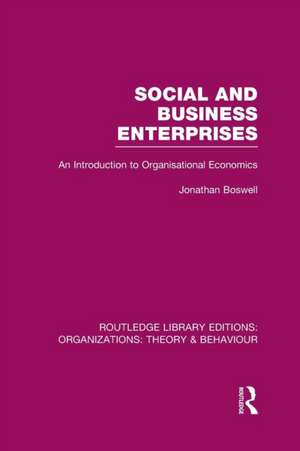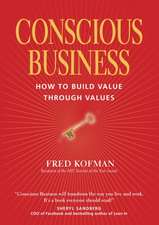Social and Business Enterprises (RLE: Organizations): An Introduction to Organisational Economics: Routledge Library Editions: Organizations
Autor Jonathan Boswellen Limba Engleză Paperback – 21 dec 2015
The author introduces economic controversies on organisational power, exchange and self-interest, generosity and public spirit. He outlines many practical uses of such concepts as marginalism, opportunity cost, time preference and risk, scale economies and diseconomies, market power, public goods and externalities. He applies economics to business planning and budgeting problems and also to the problems of social enterprises in obtaining resources through charges and grants and in allocating these resources ‘efficiently’ and ‘fairly’.
A distinctive feature of the book is that it analyses problems in the wide context of business, public and voluntary organisations. Unlike many conventional texts it is not highly abstract, technical or descriptive. Drawing on his extensive experience, the author provides many real-life and typical case studies to highlight his central theme: the fruitful interaction between abiding economic ideas and contemporary organisational problems.
| Toate formatele și edițiile | Preț | Express |
|---|---|---|
| Paperback (1) | 198.19 lei 43-57 zile | |
| Taylor & Francis – 21 dec 2015 | 198.19 lei 43-57 zile | |
| Hardback (2) | 437.50 lei 43-57 zile | |
| EDINBURGH UNIVERSITY PRESS – 30 dec 2014 | 473.48 lei 22-36 zile | |
| Taylor & Francis – 20 mar 2013 | 437.50 lei 43-57 zile |
Din seria Routledge Library Editions: Organizations
-
 Preț: 341.55 lei
Preț: 341.55 lei - 18%
 Preț: 782.62 lei
Preț: 782.62 lei -
 Preț: 416.22 lei
Preț: 416.22 lei -
 Preț: 436.14 lei
Preț: 436.14 lei -
 Preț: 416.22 lei
Preț: 416.22 lei - 13%
 Preț: 295.74 lei
Preț: 295.74 lei - 16%
 Preț: 130.21 lei
Preț: 130.21 lei - 18%
 Preț: 1173.97 lei
Preț: 1173.97 lei - 18%
 Preț: 778.82 lei
Preț: 778.82 lei -
 Preț: 416.22 lei
Preț: 416.22 lei - 18%
 Preț: 1004.24 lei
Preț: 1004.24 lei -
 Preț: 416.22 lei
Preț: 416.22 lei - 13%
 Preț: 297.62 lei
Preț: 297.62 lei - 12%
 Preț: 299.52 lei
Preț: 299.52 lei - 12%
 Preț: 299.52 lei
Preț: 299.52 lei - 14%
 Preț: 299.52 lei
Preț: 299.52 lei - 12%
 Preț: 299.52 lei
Preț: 299.52 lei -
 Preț: 416.22 lei
Preț: 416.22 lei - 18%
 Preț: 782.62 lei
Preț: 782.62 lei - 18%
 Preț: 1357.51 lei
Preț: 1357.51 lei - 24%
 Preț: 278.92 lei
Preț: 278.92 lei -
 Preț: 416.22 lei
Preț: 416.22 lei - 34%
 Preț: 623.71 lei
Preț: 623.71 lei -
 Preț: 416.22 lei
Preț: 416.22 lei - 34%
 Preț: 764.34 lei
Preț: 764.34 lei - 34%
 Preț: 825.06 lei
Preț: 825.06 lei - 12%
 Preț: 299.52 lei
Preț: 299.52 lei - 18%
 Preț: 887.29 lei
Preț: 887.29 lei - 34%
 Preț: 825.25 lei
Preț: 825.25 lei - 33%
 Preț: 1608.44 lei
Preț: 1608.44 lei - 33%
 Preț: 11175.09 lei
Preț: 11175.09 lei
Preț: 198.19 lei
Nou
Puncte Express: 297
Preț estimativ în valută:
37.92€ • 39.70$ • 31.56£
37.92€ • 39.70$ • 31.56£
Carte tipărită la comandă
Livrare economică 31 martie-14 aprilie
Preluare comenzi: 021 569.72.76
Specificații
ISBN-13: 9781138982130
ISBN-10: 113898213X
Pagini: 220
Dimensiuni: 156 x 234 x 12 mm
Greutate: 0.45 kg
Ediția:1
Editura: Taylor & Francis
Colecția Routledge
Seria Routledge Library Editions: Organizations
Locul publicării:Oxford, United Kingdom
ISBN-10: 113898213X
Pagini: 220
Dimensiuni: 156 x 234 x 12 mm
Greutate: 0.45 kg
Ediția:1
Editura: Taylor & Francis
Colecția Routledge
Seria Routledge Library Editions: Organizations
Locul publicării:Oxford, United Kingdom
Public țintă
General, Postgraduate, Professional, and UndergraduateCuprins
List of Figures, tables. Foreword. Acknowledgements. Introduction. 1. Orienting Thoughts on Information. 2. The Structuring of Information. 3. The Sharing of Information. 4. Dynamic Behaviour: The Social Learning Cycle. 5. Institutions. 6. Culture as Economizing. 7. Case Study – Socialist Transformations. 8. Conclusions.
Recenzii
‘A first class treatise…a milestone in economic thinking’ Ervin Laslo, The General Evolution Group
‘Boisot is a fine writer, an elegant thinker….This knowledge of culture is indispensable to the design of strategies for institutional change’ Laurence E Lynn Jr, University of Chicago
‘This is one of those rare path-breaking books which academics or practitioners should not ignore.’ John Child, University of Cambridge.
‘Boisot is a fine writer, an elegant thinker….This knowledge of culture is indispensable to the design of strategies for institutional change’ Laurence E Lynn Jr, University of Chicago
‘This is one of those rare path-breaking books which academics or practitioners should not ignore.’ John Child, University of Cambridge.
Descriere
This book shows how economics can be used to clarify and stimulate thinking about organisations and their decision problems. It is mainly designed for university students of economics, management and business studies and of public and social administration. But its clear and lively exposition will have a wider appeal.
The author introduces economic controversies on organisational power, exchange and self-interest, generosity and public spirit. He outlines many practical uses of such concepts as marginalism, opportunity cost, time preference and risk, scale economies and diseconomies, market power, public goods and externalities. He applies economics to business planning and budgeting problems and also to the problems of social enterprises in obtaining resources through charges and grants and in allocating these resources ‘efficiently’ and ‘fairly’.
The author introduces economic controversies on organisational power, exchange and self-interest, generosity and public spirit. He outlines many practical uses of such concepts as marginalism, opportunity cost, time preference and risk, scale economies and diseconomies, market power, public goods and externalities. He applies economics to business planning and budgeting problems and also to the problems of social enterprises in obtaining resources through charges and grants and in allocating these resources ‘efficiently’ and ‘fairly’.























